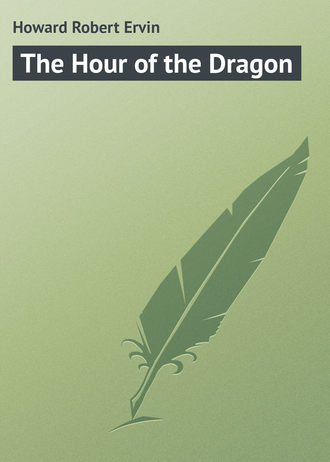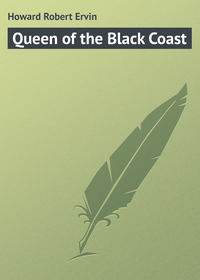 полная версия
полная версияThe Hour of the Dragon
Tarascus hesitated, glanced at the remaining man-at-arms, and his squire, a gaunt, saturnine man in black mail, and took a step forward. He was far inferior in size and strength to the giant Cimmerian, but he was in full armor, and was famed in all the western nations as a swordsman. But his squire caught his arm.
'Nay, your Majesty, do not throw away your life. I will summon archers to shoot this barbarian, as we shoot lions.'
Neither of them had noticed that a chariot had approached while the fight was going on, and now came to a halt before them. But Conan saw, looking over their shoulders, and a queer chill sensation crawled along his spine. There was something vaguely unnatural about the appearance of the black horses that drew the vehicle, but it was the occupant of the chariot that arrested the king's attention.
He was a tall man, superbly built, clad in a long unadorned silk robe. He wore a Shemitish head-dress, and its lower folds hid his features, except for the dark, magnetic eyes. The hands that grasped the reins, pulling the rearing horses back on their haunches, were white but strong. Conan glared at the stranger, all his primitive instincts roused. He sensed an aura of menace and power that exuded from this veiled figure, a menace as definite as the windless waving of tall grass that marks the path of the serpent.
'Hail, Xaltotun!' exclaimed Tarascus. 'Here is the king of Aquilonia! He did not die in the landslide as we thought.'
'I know,' answered the other, without bothering to say how he knew. 'What is your present intention?'
'I will summon the archers to slay him,' answered the Nemedian. 'As long as he lives he will be dangerous to us.'
'Yet even a dog has uses,' answered Xaltotun. 'Take him alive.'
Conan laughed raspingly. 'Come in and try!' he challenged. 'But for my treacherous legs I'd hew you out of that chariot like a woodman hewing a tree. But you'll never take me alive, damn you!'
'He speaks the truth, I fear,' said Tarascus. 'The man is a barbarian, with the senseless ferocity of a wounded tiger. Let me summon the archers.'
'Watch me and learn wisdom,' advised Xaltotun.
His hand dipped into his robe and came out with something shining – a glistening sphere. This he threw suddenly at Conan. The Cimmerian contemptuously struck it aside with his sword – at the instant of contact there was a sharp explosion, a flare of white, blinding flame, and Conan pitched senseless to the ground.
'He is dead?' Tarascus' tone was more assertion than inquiry.
'No. He is but senseless. He will recover his senses in a few hours. Bid your men bind his arms and legs and lift him into my chariot.'
With a gesture Tarascus did so, and they heaved the senseless king into the chariot, grunting with their burden. Xaltotun threw a velvet cloak over his body, completely covering him from any who might peer in. He gathered the reins in his hands.
'I'm for Belverus,' he said. 'Tell Amalric that I will be with him if he needs me. But with Conan out of the way, and his army broken, lance and sword should suffice for the rest of the conquest. Prospero cannot be bringing more than ten thousand men to the field, and will doubtless fall back to Tarantia when he hears the news of the battle. Say nothing to Amalric or Valerius or anyone about our capture. Let them think Conan died in the fall of the cliffs.'
He looked at the man-at-arms for a long space, until the guardsman moved restlessly, nervous under the scrutiny.
'What is that about your waist?' Xaltotun demanded.
'Why, my girdle, may it please you, my lord!' stuttered the amazed guardsman.
'You lie!' Xaltotun's laugh was merciless as a sword-edge. 'It is a poisonous serpent! What a fool you are, to wear a reptile about your waist!'
With distended eyes the man looked down; and to his utter horror he saw the buckle of his girdle rear up at him. It was a snake's head! He saw the evil eyes and the dripping fangs, heard the hiss and felt the loathsome contact of the thing about his body. He screamed hideously and struck at it with his naked hand, felt its fangs flesh themselves in that hand – and then he stiffened and fell heavily. Tarascus looked down at him without expression. He saw only the leathern girdle and the buckle, the pointed tongue of which was stuck in the guardsman's palm. Xaltotun turned his hypnotic gaze on Tarascus' squire, and the man turned ashen and began to tremble, but the king interposed: 'Nay, we can trust him.'
The sorcerer tautened the reins and swung the horses around.
'See that this piece of work remains secret. If I am needed, let Altaro, Orastes' servant, summon me as I have taught him. I will be in your palace at Belverus.'
Tarascus lifted his hand in salutation, but his expression was not pleasant to see as he looked after the departing mesmerist.
'Why should he spare the Cimmerian?' whispered the frightened squire.
'That I am wondering myself,' grunted Tarascus.
Behind the rumbling chariot the dull roar of battle and pursuit faded in the distance; the setting sun rimmed the cliffs with scarlet flame, and the chariot moved into the vast blue shadows floating up out of the east.
4
'From What Hell Have You Crawled?'
Of that long ride in the chariot of Xaltotun, Conan knew nothing. He lay like a dead man while the bronze wheels clashed over the stones of mountain roads and swished through the deep grass of fertile valleys, and finally dropping down from the rugged heights, rumbled rhythmically along the broad white road that winds through the rich meadowlands to the walls of Belverus.
Just before dawn some faint reviving of life touched him. He heard a mumble of voices, the groan of ponderous hinges. Through a slit in the cloak that covered him he saw, faintly in the lurid glare of torches, the great black arch of a gateway, and the bearded faces of men-at-arms, the torches striking fire from their spearheads and helmets.
'How went the battle, my fair lord?' spoke an eager voice, in the Nemedian tongue.
'Well indeed,' was the curt reply. 'The king of Aquilonia lies slain and his host is broken.'
A babble of excited voices rose, drowned the next instant by the whirling wheels of the chariot on the flags. Sparks flashed from under the revolving rims as Xaltotun lashed his steeds through the arch. But Conan heard one of the guardsmen mutter: 'From beyond the border to Belverus between sunset and dawn! And the horses scarcely sweating! By Mitra, they – ' Then silence drank the voices, and there was only the clatter of hoofs and wheels along the shadowy street.
What he had heard registered itself on Conan's brain but suggested nothing to him. He was like a mindless automaton that hears and sees, but does not understand. Sights and sounds flowed meaninglessly about him. He lapsed again into a deep lethargy, and was only dimly aware when the chariot halted in a deep, high-walled court, and he was lifted from it by many hands and borne up a winding stone stair, and down a long dim corridor. Whispers, stealthy footsteps, unrelated sounds surged or rustled about him, irrelevant and far away.
Yet his ultimate awakening was abrupt and crystal-clear. He possessed full knowledge of the battle in the mountains and its sequences, and he had a good idea of where he was.
He lay on a velvet couch, clad as he was the day before, but with his limbs loaded with chains not even he could break. The room in which he lay was furnished with somber magnificence, the walls covered with black velvet tapestries, the floor with heavy purple carpets. There was no sign of door or window, and one curiously carven gold lamp, swinging from the fretted ceiling, shed a lurid light over all.
In that light the figure seated in a silver, throne-like chair before him seemed unreal and fantastic, with an illusiveness of outline that was heightened by a filmy silken robe. But the features were distinct – unnaturally so in that uncertain light. It was almost as if a weird nimbus played about the man's head, casting the bearded face into bold relief, so that it was the only definite and distinct reality in that mystic, ghostly chamber.
It was a magnificent face, with strongly chiseled features of classical beauty. There was, indeed, something disquieting about the calm tranquility of its aspect, a suggestion of more than human knowledge, of a profound certitude beyond human assurance. Also an uneasy sensation of familiarity twitched at the back of Conan's consciousness. He had never seen this man's face before, he well knew; yet those features reminded him of something or someone. It was like encountering in the flesh some dream-image that had haunted one in nightmares.
'Who are you?' demanded the king belligerently, struggling to a sitting position in spite of his chains.
'Men call me Xaltotun,' was the reply, in a strong, golden voice.
'What place is this?' the Cimmerian next demanded.
'A chamber in the palace of King Tarascus, in Belverus.'
Conan was not surprised. Belverus, the capital, was at the same time the largest Nemedian city so near the border.
'And where's Tarascus?'
'With the army.'
'Well,' growled Conan, 'if you mean to murder me, why don't you do it and get it over with?'
'I did not save you from the king's archers to murder you in Belverus,' answered Xaltotun.
'What the devil did you do to me?' demanded Conan.
'I blasted your consciousness,' answered Xaltotun. 'How, you would not understand. Call it black magic, if you will.'
Conan had already reached that conclusion, and was mulling over something else.
'I think I understand why you spared my life,' he rumbled. 'Amalric wants to keep me as a check on Valerius, in case the impossible happens and he becomes king of Aquilonia. It's well known that the baron of Tor is behind this move to seat Valerius on my throne. And if I know Amalric, he doesn't intend that Valerius shall be anything more than a figurehead, as Tarascus is now.'
'Amalric knows nothing of your capture,' answered Xaltotun. 'Neither does Valerius. Both think you died at Valkia.'
Conan's eyes narrowed as he stared at the man in silence.
'I sensed a brain behind all this,' he muttered, 'but I thought it was Amalric's. Are Amalric, Tarascus and Valerius all but puppets dancing on your string? Who are you?'
'What does it matter? If I told you, you would not believe me. What if I told you I might set you back on the throne of Aquilonia?'
Conan's eyes burned on him like a wolf.
'What's your price?'
'Obedience to me.'
'Go to hell with your offer!' snarled Conan. 'I'm no figurehead. I won my crown with my sword. Besides, it's beyond your power to buy and sell the throne of Aquilonia at your will. The kingdom's not conquered; one battle doesn't decide a war.'
'You war against more than swords,' answered Xaltotun. 'Was it a mortal's sword that felled you in your tent before the fight? Nay, it was a child of the dark, a waif of outer space, whose fingers were afire with the frozen coldness of the black gulfs, which froze the blood in your veins and the marrow of your thews. Coldness so cold it burned your flesh like white-hot iron!
'Was it chance that led the man who wore your harness to lead his knights into the defile? – chance that brought the cliffs crashing down upon them?'
Conan glared at him unspeaking, feeling a chill along his spine. Wizards and sorcerers abounded in his barbaric mythology, and any fool could tell that this was no common man. Conan sensed an inexplicable something about him that set him apart – an alien aura of Time and Space, a sense of tremendous and sinister antiquity. But his stubborn spirit refused to flinch.
'The fall of the cliffs was chance,' he muttered truculently. 'The charge into the defile was what any man would have done.'
'Not so. You would not have led a charge into it. You would have suspected a trap. You would never have crossed the river in the first place, until you were sure the Nemedian rout was real. Hypnotic suggestions would not have invaded your mind, even in the madness of battle, to make you mad, and rush blindly into the trap laid for you, as it did the lesser man who masqueraded as you.'
'Then if this was all planned,' Conan grunted skeptically, 'all a plot to trap my host, why did not the "child of darkness" kill me in my tent?'
'Because I wished to take you alive. It took no wizardry to predict that Pallantides would send another man out in your harness. I wanted you alive and unhurt. You may fit into my scheme of things. There is a vital power about you greater than the craft and cunning of my allies. You are a bad enemy, but might make a fine vassal.'
Conan spat savagely at the word, and Xaltotun, ignoring his fury, took a crystal globe from a near-by table and placed it before him. He did not support it in any way, nor place it on anything, but it hung motionless in midair, as solidly as if it rested on an iron pedestal. Conan snorted at this bit of necromancy, but he was nevertheless impressed.
'Would you know of what goes on in Aquilonia?' he asked.
Conan did not reply, but the sudden rigidity of his form betrayed his interest.
Xaltotun stared into the cloudy depths, and spoke: 'It is now the evening of the day after the battle of Valkia. Last night the main body of the army camped by Valkia, while squadrons of knights harried the fleeing Aquilonians. At dawn the host broke camp and pushed westward through the mountains. Prospero, with ten thousand Poitanians, was miles from the battlefield when he met the fleeing survivors in the early dawn. He had pushed on all night, hoping to reach the field before the battle joined. Unable to rally the remnants of the broken host, he fell back toward Tarantia. Riding hard, replacing his wearied horses with steeds seized from the countryside, he approaches Tarantia.
'I see his weary knights, their armor gray with dust, their pennons drooping as they push their tired horses through the plain. I see, also, the streets of Tarantia. The city is in turmoil. Somehow word has reached the people of the defeat and the death of King Conan. The mob is mad with fear, crying out that the king is dead, and there is none to lead them against the Nemedians. Giant shadows rush on Aquilonia from the east, and the sky is black with vultures.'
Conan cursed deeply.
'What are these but words? The raggedest beggar in the street might prophesy as much. If you say you saw all that in the glass ball, then you're a liar as well as a knave, of which last there's no doubt! Prospero will hold Tarantia, and the barons will rally to him. Count Trocero of Poitain commands the kingdom in my absence, and he'll drive these Nemedian dogs howling back to their kennels. What are fifty thousand Nemedians? Aquilonia will swallow them up. They'll never see Belverus again. It's not Aquilonia which was conquered at Valkia; it was only Conan.'
'Aquilonia is doomed,' answered Xaltotun, unmoved. 'Lance and ax and torch shall conquer her; or if they fail, powers from the dark of ages shall march against her. As the cliffs fell at Valkia, so shall walled cities and mountains fall, if the need arise, and rivers roar from their channels to drown whole provinces.
'Better if steel and bowstring prevail without further aid from the arts, for the constant use of mighty spells sometimes sets forces in motion that might rock the universe.'
'From what hell have you crawled, you nighted dog?' muttered Conan, staring at the man. The Cimmerian involuntarily shivered; he sensed something incredibly ancient, incredibly evil.
Xaltotun lifted his head, as if listening to whispers across the void. He seemed to have forgotten his prisoner. Then he shook his head impatiently, and glanced impersonally at Conan.
'What? Why, if I told you, you would not believe me. But I am wearied of conversation with you; it is less fatiguing to destroy a walled city than it is to frame my thoughts in words a brainless barbarian can understand.'
'If my hands were free,' opined Conan, 'I'd soon make a brainless corpse out of you.'
'I do not doubt it, if I were fool enough to give you the opportunity,' answered Xaltotun, clapping his hands.
His manner had changed; there was impatience in his tone, and a certain nervousness in his manner, though Conan did not think this attitude was in any way connected with himself.
'Consider what I have told you, barbarian,' said Xaltotun. 'You will have plenty of leisure. I have not yet decided what I shall do with you. It depends on circumstances yet unborn. But let this be impressed upon you: that if I decide to use you in my game, it will be better to submit without resistance than to suffer my wrath.'
Conan spat a curse at him, just as hangings that masked a door swung apart and four giant negroes entered. Each was clad only in a silken breech-cloth supported by a girdle, from which hung a great key.
Xaltotun gestured impatiently toward the king and turned away, as if dismissing the matter entirely from his mind. His fingers twitched queerly. From a carven green jade box he took a handful of shimmering black dust, and placed it in a brazier which stood on a golden tripod at his elbow. The crystal globe, which he seemed to have forgotten, fell suddenly to the floor, as if its invisible support had been removed.
Then the blacks had lifted Conan – for so loaded with chains was he that he could not walk – and carried him from the chamber. A glance back, before the heavy, gold-bound teak door was closed, showed him Xaltotun leaning back in his throne-like chair, his arms folded, while a thin wisp of smoke curled up from the brazier. Conan's scalp prickled. In Stygia, that ancient and evil kingdom that lay far to the south, he had seen such black dust before. It was the pollen of the black lotus, which creates death-like sleep and monstrous dreams; and he knew that only the grisly wizards of the Black Ring, which is the nadir of evil, voluntarily seek the scarlet nightmares of the black lotus, to revive their necromantic powers.
The Black Ring was a fable and a lie to most folk of the western world, but Conan knew of its ghastly reality, and its grim votaries who practise their abominable sorceries amid the black vaults of Stygia and the nighted domes of accursed Sabatea.
He glanced back at the cryptic, gold-bound door, shuddering at what it hid.
Whether it was day or night the king could not tell. The palace of King Tarascus seemed a shadowy, nighted place, that shunned natural illumination. The spirit of darkness and shadow hovered over it, and that spirit, Conan felt, was embodied in the stranger Xaltotun. The negroes carried the king along a winding corridor so dimly lighted that they moved through it like black ghosts bearing a dead man, and down a stone stair that wound endlessly. A torch in the hand of one cast the great deformed shadows streaming along the wall; it was like the descent into hell of a corpse borne by dusky demons.
At last they reached the foot of the stair, and then they traversed a long straight corridor, with a blank wall on one hand pierced by an occasional arched doorway with a stair leading up behind it, and on the other hand another wall showing heavy barred doors at regular intervals of a few feet.
Halting before one of these doors, one of the blacks produced the key that hung at his girdle, and turned it in the lock. Then, pushing open the grille, they entered with their captive. They were in a small dungeon with heavy stone walls, floor and ceiling, and in the opposite wall there was another grilled door. What lay beyond that door Conan could not tell, but he did not believe it was another corridor. The glimmering light of the torch, flickering through the bars, hinted at shadowy spaciousness and echoing depths.
In one corner of the dungeon, near the door through which they had entered, a cluster of rusty chains hung from a great iron ring set in the stone. In these chains a skeleton dangled. Conan glared at it with some curiosity, noticing the state of the bare bones, most of which were splintered and broken; the skull which had fallen from the vertebrae, was crushed as if by some savage blow of tremendous force.
Stolidly one of the blacks, not the one who had opened the door, removed the chains from the ring, using his key on the massive lock, and dragged the mass of rusty metal and shattered bones over to one side. Then they fastened Conan's chains to that ring, and the third black turned his key in the lock of the farther door, grunting when he had assured himself that it was properly fastened.
Then they regarded Conan cryptically, slit-eyed ebony giants, the torch striking highlights from their glossy skin.
He who held the key to the nearer door was moved to remark, gutturally: 'This your palace now, white dog-king! None but master and we know. All palace sleep. We keep secret. You live and die here, maybe. Like him!' He contemptuously kicked the shattered skull and sent it clattering across the stone floor.
Conan did not deign to reply to the taunt, and the black, galled perhaps by his prisoner's silence, muttered a curse, stooped and spat full in the king's face. It was an unfortunate move for the black. Conan was seated on the floor, the chains about his waist; ankles and wrists locked to the ring in the wall. He could neither rise, nor move more than a yard out from the wall. But there was considerable slack in the chains that shackled his wrists, and before the bullet-shaped head could be withdrawn out of reach, the king gathered this slack in his mighty hand and smote the black on the head. The man fell like a butchered ox, and his comrades stared to see him lying with his scalp laid open, and blood oozing from his nose and ears.
But they attempted no reprisal, nor did they accept Conan's urgent invitation to approach within reach of the bloody chain in his hand. Presently, grunting in their ape-like speech, they lifted the senseless black and bore him out like a sack of wheat, arms and legs dangling. They used his key to lock the door behind them, but did not remove it from the gold chain that fastened it to his girdle. They took the torch with them, and as they moved up the corridor the darkness slunk behind them like an animate thing. Their soft padding footsteps died away, with the glimmer of their torch, and darkness and silence remained unchallenged.
5
The Haunter of the Pits
Conan lay still, enduring the weight of his chains and the despair of his position with the stoicism of the wilds that had bred him. He did not move, because the jangle of his chains, when he shifted his body, sounded startlingly loud in the darkness and stillness, and it was his instinct, born of a thousand wilderness-bred ancestors, not to betray his position in his helplessness. This did not result from a logical reasoning process; he did not lie quiet because he reasoned that the darkness hid lurking dangers that might discover him in his helplessness. Xaltotun had assured him that he was not to be harmed, and Conan believed that it was in the man's interest to preserve him, at least for the time being. But the instincts of the wild were there, that had caused him in his childhood to lie hidden and silent while wild beasts prowled about his covert.
Even his keen eyes could not pierce the solid darkness. Yet after a while, after a period of time he had no way of estimating, a faint glow became apparent, a sort of slanting gray beam, by which Conan could see, vaguely, the bars of the door at his elbow, and even make out the skeleton of the other grille. This puzzled him, until at last he realized the explanation. He was far below ground, in the pits below the palace; yet for some reason a shaft had been constructed from somewhere above. Outside, the moon had risen to a point where its light slanted dimly down the shaft. He reflected that in this manner he could tell the passing of the days and nights. Perhaps the sun, too, would shine down that shaft, though on the other hand it might be closed by day. Perhaps it was a subtle method of torture, allowing a prisoner but a glimpse of daylight or moonlight.
His gaze fell on the broken bones in the farther corner, glimmering dimly. He did not tax his brain with futile speculation as to who the wretch had been and for what reason he had been doomed, but he wondered at the shattered condition of the bones. They had not been broken on a rack. Then, as he looked, another unsavory detail made itself evident. The shin-bones were split lengthwise, and there was but one explanation; they had been broken in that manner in order to obtain the marrow. Yet what creature but man breaks bones for their marrow? Perhaps those remnants were mute evidence of a horrible, cannibalistic feast, of some wretch driven to madness by starvation. Conan wondered if his own bones would be found at some future date, hanging in their rusty chains. He fought down the unreasoning panic of a trapped wolf.









